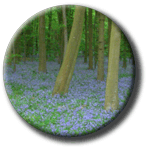Local Designations
T
he Planning Authority for any given area may designate certain
areas as being of local conservation interest.  This
is the lowest tier of conservation designation, and varies from area to area.
The criteria for inclusion, and the level of protection provided, if any, may
not be exactly the same in all areas. In England and Wales most individual counties
have a different scheme, although most such schemes are similar, and some are
identical. The local plan will designate a certain level of protection for such
areas. This will be a purely planning protection, i.e. it will provide a limited
level of protection against developments of certain types. However, it provides
no protection at all for species and habitats as such, nor does it have any
effect upon management - or lack of it.
This
is the lowest tier of conservation designation, and varies from area to area.
The criteria for inclusion, and the level of protection provided, if any, may
not be exactly the same in all areas. In England and Wales most individual counties
have a different scheme, although most such schemes are similar, and some are
identical. The local plan will designate a certain level of protection for such
areas. This will be a purely planning protection, i.e. it will provide a limited
level of protection against developments of certain types. However, it provides
no protection at all for species and habitats as such, nor does it have any
effect upon management - or lack of it.
These areas are given a name and invariably an acronym. For
example, a Site of Importance for Nature Conservation (SINC). This acronym is
used in Essex, the Isle of Wight and many other counties. The areas have often
been identified by the local Wildlife
Trust and agreed by the planning authority. In practice, in many areas, the local
Wildlife Trust, although a non-statutory body, has the most important role in
advising on the scheme. Such areas are sometimes revised regularly, but often
revisions are patchy, and if the local plan is old the designations may also
be rather old and out-of-date.
and agreed by the planning authority. In practice, in many areas, the local
Wildlife Trust, although a non-statutory body, has the most important role in
advising on the scheme. Such areas are sometimes revised regularly, but often
revisions are patchy, and if the local plan is old the designations may also
be rather old and out-of-date.
Many of these schemes now refer to COWS - an acronym for Country
Wildlife Site. Other acronyms include SNCI, ANCI, SCWI and many others.
To find out more about these local designations consult the
Wildlife Trust or planning authority for the area you are interested in.
Hampshire
County Council SINC website: lots of useful information.

 This
is the lowest tier of conservation designation, and varies from area to area.
The criteria for inclusion, and the level of protection provided, if any, may
not be exactly the same in all areas. In England and Wales most individual counties
have a different scheme, although most such schemes are similar, and some are
identical. The local plan will designate a certain level of protection for such
areas. This will be a purely planning protection, i.e. it will provide a limited
level of protection against developments of certain types. However, it provides
no protection at all for species and habitats as such, nor does it have any
effect upon management - or lack of it.
This
is the lowest tier of conservation designation, and varies from area to area.
The criteria for inclusion, and the level of protection provided, if any, may
not be exactly the same in all areas. In England and Wales most individual counties
have a different scheme, although most such schemes are similar, and some are
identical. The local plan will designate a certain level of protection for such
areas. This will be a purely planning protection, i.e. it will provide a limited
level of protection against developments of certain types. However, it provides
no protection at all for species and habitats as such, nor does it have any
effect upon management - or lack of it.